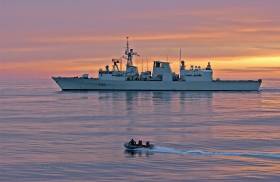Displaying items by tag: Operation Reassurance
#NATOfrigate - A Royal Canadian Navy ‘Halifax’ frigate is to call to Dublin Port next week and which has been deployed on Operation Reasurrance for a NATO Force.
HMCS Frederiction is to join the Standing NATO Maritime Forces fleet based in the Mediterranean Sea. This is part of NATO’s assurance measures, promoting security and stability in Central and Eastern Europe.
The ship will replace HMCS Winnipeg, which has been part of Standing NATO Maritime Forces since July 2015.
HMCS Fredericton will provide Canada the flexibility to execute a range of missions across a broad spectrum of operations in support of Allied efforts in the region, including surveillance and monitoring, regional defence, diplomatic engagement and capacity building.
Operation Reasurrance is HMCS Fredericton’s second deployment in support of NATO assurance measures. It was the first modernized frigate to deploy in support of Government of Canada objectives in 2014.
The Halifax-class modernization/frigate life extension (HCM/FELEX) is a $4.3 billion program to upgrade and enhance the Royal Canadian Navy’s existing fleet of frigates.
The project includes a new Combat Management System, a new radar capability, a new electronic warfare system upgrade, and upgraded communications and missiles, as well as a new Integrated Platform Management System.
























































